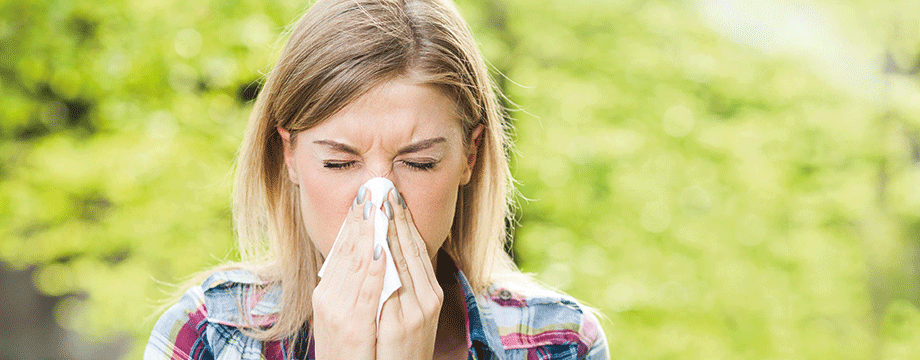Summer fever

Don’t dread the summer – read our top advice on combating hay fever, allergies and sinus issues
Hay fever or seasonal allergic rhinitis affects one in 10 people in Ireland and symptoms include a runny or blocked nose, frequent sneezing and red, itchy, watery eyes. Hay fever happens when the immune system responds to triggers such as pollen and releases histamine. Most hay fever is due to pollen from grass which peaks from early June to mid July, however tree pollen can also cause it and mould spores and weed pollen can also trigger symptoms. For some people symptoms occur all year round – this is usually due to indoor allergens such as pets, dust mites and moulds.
“Generally the hay fever season starts in early spring when lawn mowers are dragged out of sheds,” says Von Deegan of Von’s Health Store in Limerick city. “For some people it may be when the flowers are really in bloom - everybody is different.”
“The symptoms of hay fever are miserable and along with monitoring pollen forecasts and staying indoors with windows closed it causes many sufferers to dread summer,” says Tara Beirne who works at health store Tattie Hoaker in Roscommon town, “but your local health food shop carries remedies which can make life a bit easier.”
Getting ready
“The best way to prepare for hay fever season is to boost your immunity in advance,” says Tara Beirne. “A good tonic, omega-3s and probiotics are a good place to start. The herb echinacea is a well-known immune booster, vitamin C is good for immunity and a natural anti-histamine. Ask in your local health food store about herbal anti histamine tinctures, nasal sprays and homeopathic remedies which can be helpful for preventing and treating the symptoms of hay fever. A simple but effective solution is to use a barrier cream just inside the nostrils that can really help minimise how much pollen actually gets into the body. A neti pot can be used to rinse the nose, removing pollen and allergens – this is an ancient remedy and many people have found relief from it.”
“To prepare for this season start now by building up your immune defences,” says Von Deegan, “by taking a complex of vitamin C and bromelain (from pineapple) to enhance the absorption of bioflavonoids, natural anti-histamines; quercetin, often combined with pine bark, MSM and B5, all naturally ant-inflammatory; stinging nettle which is anti-inflammatory and anti-histamine; astragalus with elderberry and garlic; zinc which is great for the immune system; and a probiotic. Diet can help - avoid processed foods, alcohol, caffeine and mucus-forming foods such as milk and cheese products. Do include lots of dark green leafy vegetables, onions, garlic, elderberry (also in supplement form), plenty of fresh fruit and vegetables with a variety of colours.”
Natural help at hand
- Qu-Chi bands which work through acupressure have been found to be useful.
- Eyebright is helpful for itchy eyes and eye irritation. Available in capsules, homoeopathic remedy and eye drops.
- A combination of vitamins C, B6 and zinc can help to reduce histamine levels.
- Nettles have antihistamine action. Drink nettle tea or take a nettle tincture several times daily.
- Spirulina is known to block histamine.
- Tinctures available from health stores that can help hay fever include:
- Urtica – helps skin that breaks out in hives.
- Chamomile – an anti-inflammatory that boosts the immune system.
- Echinacea – an anti-inflammatory that enhances the immune system.
- Elderflower – helps to dry up mucus in your nose.
- Ask your local health store for a combination homeopathic remedy for hay fever symptoms.
- Consider consulting a homeopath or acupuncturist.
Allergy lifestyle tips
- Wash your sheets, pillowcases and duvet covers every week in a hot wash.
- Instead of dusting, wipe away dust with a damp cloth.
- Put away any objects or ornaments that you don’t need because they just gather dust.
- Go for wooden, tiled or linoleum floors and wipe-clean blinds instead of carpets and curtains.
- Open the windows for at least an hour every day.
- Use a dehumidifier to keep humidity between 30-50% in your home.
- Make some rooms cat or dog-free zones by closing doors.
- Groom cats and dogs outdoors.
Hay fever lifestyle tips
- Try to reduce your exposure to pollen before the season reaches
its peak.
- Wash your face and hands regularly.
- Vacuum regularly to help keep pollen levels in your home low.
- Keep your windows shut at night and early in the morning. Check out www.met.ie pollen forecasts.
- Wear wraparound sunglasses when outside help keep pollen away.
- Wear a mask when mowing the lawn.
- Use a natural pollen barrier around your nostrils to trap pollen, dust and pet allergens before they get in.
- Use a salt pipe – these carry salt particles that penetrate the respiratory system, cleansing the airways and helping to expel mucus.
- A salt air purifier disperses dry salt micro-particles into the atmosphere as you sleep, helping to open the airways, clear excess mucus and reduce inflammation.
More Rude Health articles...
Articles from our latest issue...